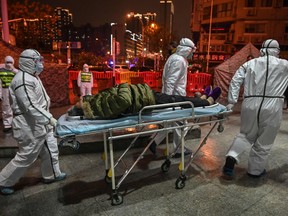U.S. urges Beijing to come clean on COVID origin as report says it likely came from lab leak
It was reported on Sunday that the U.S. Energy Department had concluded that the pandemic probably arose from a Chinese laboratory leak

Article content
WASHINGTON — The U.S. ambassador to China says Washington must put pressure on Beijing to be more “honest” about the origins of the COVID-19 pandemic.
Nicholas Burns made the comment after it was reported on Sunday that the U.S. Energy Department had concluded that the pandemic probably arose from a Chinese laboratory leak, which Beijing denies. The department reached its conclusion with “low confidence” in a classified intelligence report.
The document was provided to the White House and key members of Congress, The Wall Street Journal reported.
On Sunday, Jake Sullivan, Biden’s national security adviser, said there were a “variety of views in the intelligence community” on the origins of the virus.
The FBI has also blamed the pandemic on a Chinese lab leak. In 2021 it concluded with “moderate confidence” that it was caused by an accidental leak at the Wuhan Institute of Virology in China, which had been collecting bat viruses.
Four other U.S. agencies still believe it was the result of natural transmission, and two others are undecided — one of them reportedly being the CIA.
China’s foreign ministry pointed to a WHO-China report that suggests a natural origin for the pandemic, probably from bats. A foreign ministry spokesman said: “Certain parties should stop rehashing the ‘lab leak’ narrative, stop smearing China and stop politicizing the origins-tracing issue.”
Burns said the U.S. would need to push China to take a more active role in the World Health Organization if it wanted to strengthen the United Nations’ health agency.
The ambassador also said the Chinese spy balloon affair and Beijing’s stance on the war in Ukraine were “two of the most important issues that we’re dealing with right now.”
Burns said the U.S. had believed there was a “chance for greater stability” this year following the meeting between Joe Biden and Chinese President Xi Jinping in November.
Our website is the place for the latest breaking news, exclusive scoops, longreads and provocative commentary. Please bookmark nationalpost.com and sign up for our daily newsletter, Posted, here.












Postmedia is committed to maintaining a lively but civil forum for discussion. Please keep comments relevant and respectful. Comments may take up to an hour to appear on the site. You will receive an email if there is a reply to your comment, an update to a thread you follow or if a user you follow comments. Visit our Community Guidelines for more information.